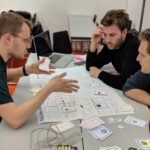Professional Ethics

Editions
| Class | Semester | Instructor | Teaching Assistant(s) |
|---|---|---|---|
| Professional Ethics 2014 | Fall |
-
|
-
|
Other Courses
Field Project (MMI)
The Field Project consists in a consultancy study on behalf of a firm, conducted by a group of 2-3 students under the supervision of a professor (“tutor”) for a standard duration of 4 months. The aim of the Field Project is to provide students with: experience in project management contact …
Mobile and Wearable Computing
The widespread use of mobile and wearable devices enables the implementation of novel services in applications areas like, e.g., mobile health, sustainability, smart working, and more. This course introduces the building blocks of such services and discusses the challenges that arise on the path towards their realization. Specific topics covered …
User Experience Design
Usability and the overall User Experience are crucial for the success of any digital product. This course takes a hands-on approach in teaching how to create useful, usable, and (well-)used digital products. Students not only develop an awareness and appreciation of the crucial implications of good interfaces in terms of …
Computer Architecture
In this course, students learn how one can describe the basic operations in a computer using digital logic, and how these operations can be realized in both hardware and software. Students gradually combine these basic operations into a “microarchitecture” — a software-controlled datapath that connects digital memory with an arithmetic-logical …
Evaluation and Experimentation
Evaluation and Experimentation Computer scientists build complex systems or choose among existing systems to satisfy perceived needs and requirements. The system is then deployed in an environment consisting of humans and other systems. How do we know the impact of the system on the environment and how well it meets …
Software Atelier 2: Human Computer Interaction
Software Atelier 2: Human Computer Interaction Goal of the course is to provide students with theoretical and practical knowledge of human-centered design of interfaces for computing systems. The course starts with an introduction to ethics that investigates the many ways and venues information and communication technologies can be used maliciously. …
Recent News
Postdoc position – XAI-FinCrime: Explainable AI for Financial Crime Detection and Prevention, Lugano, Switzerland
The People-Centered Computing Lab in the Faculty of Informatics at the Università della Svizzera italiana (USI) in Lugano, Switzerland is...
PhD position in Innosuisse-funded research project “XAI-FinCrime: Explainable AI for Financial Crime Detection and Prevention,” Lugano, Switzerland
The People-Centered Computing Lab in the Faculty of Informatics at the Università della Svizzera italiana (USI) in Lugano, Switzerland is...
Prof. Silvia Santini’s contribution on “La Regione”
Digital devices and apps are increasingly integrated with our daily lives and even our bodies. This prompts concerns, but it...
Our group members ranked among the World’s top 2% of Scientists
On October 10, 2022, Stanford University published the revised Science-wide author databases of standardized citation indicators – ranking the top...










